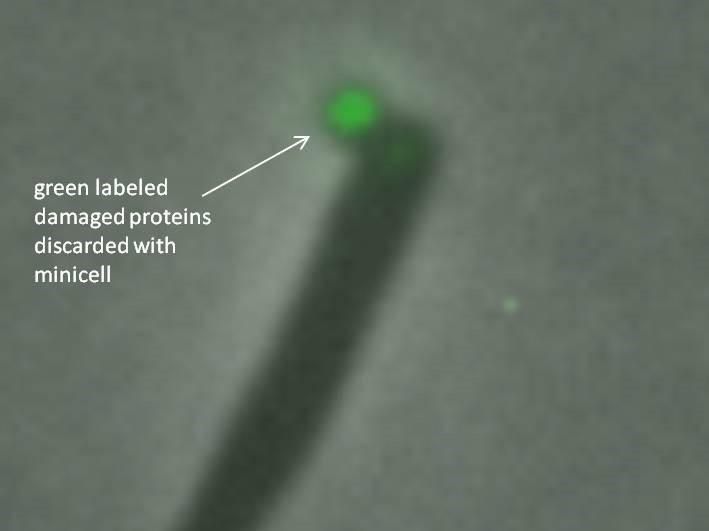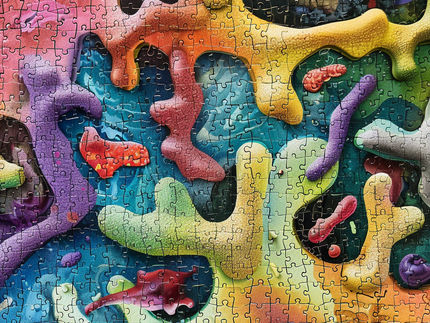Study shows that ingestion of microplastics alters gut microbiota
CSIC researchers have discovered that the digestion of microplastics can decrease the amount of beneficial bacteria present in the colon.
A group of researchers from the CSIC has discovered that the ingestion of microplastics reduces the bacterial diversity of the microbiota of the colon, in addition to producing an alteration of the balance in the microorganisms present. The study, published in Scientific Reports, has shown that after the ingestion of PET microplastics (associated with the food chain) the abundance of bacteria known for their positive effects on health decreases and the presence of other microbial groups related to pathogenic activity increases. "Given the possible chronic exposure to these particles through our diet, the results obtained suggest that their continued intake could alter the intestinal balance and, therefore, health," says Victoria Moreno, a researcher at the Food Science Research Institute (CIAL) of the CSIC.
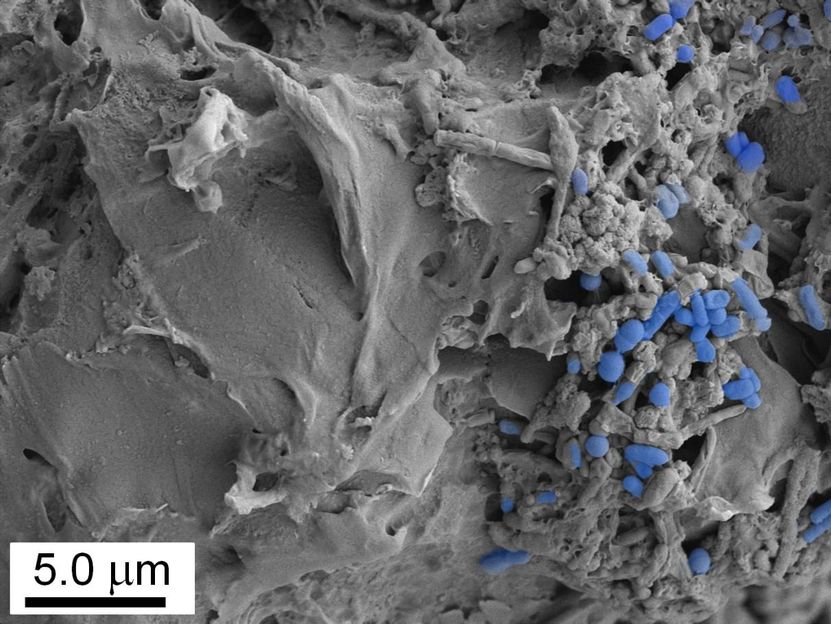
Microscopic image of microplastics colonized by the intestinal microbiota.
CSIC
The study, which also involved the Institute of Catalysis and Petrochemistry (ICP) and the Institute of Ceramics and Glass (ICV) of the CSIC, takes on great relevance as the first to assess the impact of microplastic ingestion in the digestive tract and human intestinal microbiota. "It is necessary to know the fate in the body of these materials present in our daily lives and the consequences in the short, medium and long term", defends Moreno. The latest estimates indicate that, on average, each person could ingest between 0.1 and 5 grams of microplastics each week through food and beverages.
In addition, the study has shown for the first time that these microplastics can undergo biotransformations along the gastrointestinal tract and reach the colon with a form structurally different from the original. "All these observed mechanisms and factors, which are just beginning to be studied, will contribute to finding out whether microplastics can remain in the human body and potentially accumulate in some organs and tissues," the researcher concludes.
Innovative in vitro experiments
To develop this research, the CSIC interdisciplinary team has designed a protocol to simulate the ingestion and digestion of microplastics under physiological conditions, which can be extrapolated to the study of other types of plastic and particle sizes. "Using CSIC's patented in vitro model of gastrointestinal digestion, simgi®, we were able to host the human colonic microbiota during the microplastic intervention," explains Victoria Moreno. This protocol, combined with the use of electron microscopy and spectroscopy, has made it possible to monitor changes in the structure and morphology of microplastics in the digestive tract.
The work has been developed within the framework of the Susplast platform and the European project on the study of the effects of micro and nanoplastics on human health, PlasticsFatE.
Note: This article has been translated using a computer system without human intervention. LUMITOS offers these automatic translations to present a wider range of current news. Since this article has been translated with automatic translation, it is possible that it contains errors in vocabulary, syntax or grammar. The original article in Spanish can be found here.
Original publication
Referencia científica: Tamargo, A.; Molinero, N.; Reinosa, J.; Alcolea-Rodriguez, V.; Portela, R.; Bañares, MA.; Fernández JF; Moreno-Arribas, M.V.; "PET Microplastics Affect Human Gut Microbiota Communities During Simulated Gastrointestinal Digestion. First Evidence of Plausible Polymer Biodegradation During Human Digestion."; Scientific Reports.
Most read news
Original publication
Referencia científica: Tamargo, A.; Molinero, N.; Reinosa, J.; Alcolea-Rodriguez, V.; Portela, R.; Bañares, MA.; Fernández JF; Moreno-Arribas, M.V.; "PET Microplastics Affect Human Gut Microbiota Communities During Simulated Gastrointestinal Digestion. First Evidence of Plausible Polymer Biodegradation During Human Digestion."; Scientific Reports.
Organizations
Other news from the department science

Get the life science industry in your inbox
By submitting this form you agree that LUMITOS AG will send you the newsletter(s) selected above by email. Your data will not be passed on to third parties. Your data will be stored and processed in accordance with our data protection regulations. LUMITOS may contact you by email for the purpose of advertising or market and opinion surveys. You can revoke your consent at any time without giving reasons to LUMITOS AG, Ernst-Augustin-Str. 2, 12489 Berlin, Germany or by e-mail at revoke@lumitos.com with effect for the future. In addition, each email contains a link to unsubscribe from the corresponding newsletter.
Most read news
More news from our other portals
Last viewed contents
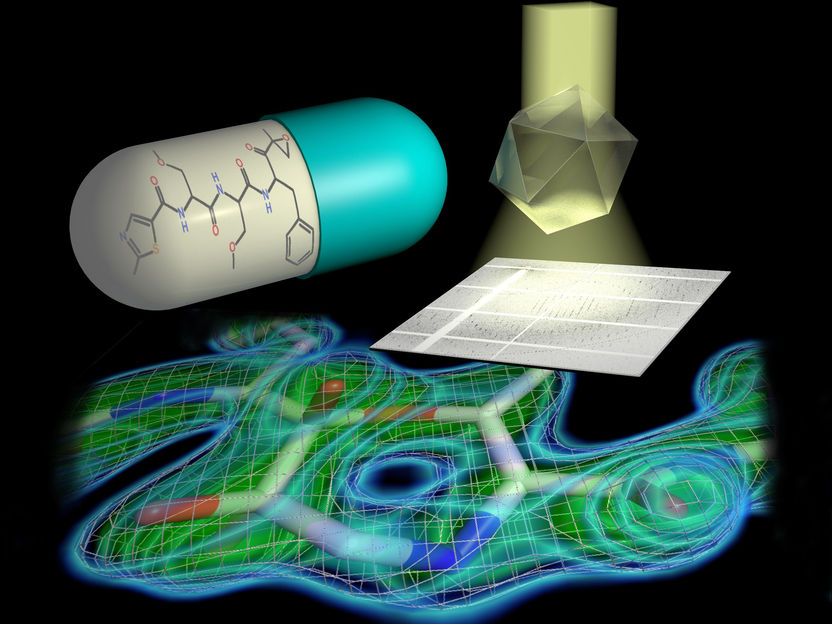
Detailed structure of cell’s garbage disposal unit reveals surprise in how it is targeted by cancer drugs - Every atom counts
Centre_for_Infectious_Disease_Research_in_Zambia_(CIDRZ)
XYY_syndrome
Category:Perineum
Glomerulus
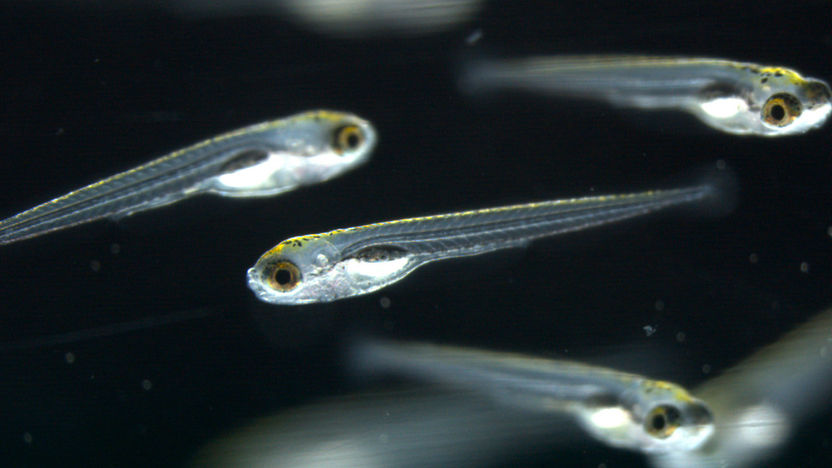
Larvae Help in Search for Appetite Suppressants - Zebrafish as a novel testing system for psychoactive substances
Glycogen_storage_disease
Spinocerebellar_ataxia_type-13

Bruker to acquire the NanoString business in an asset deal
